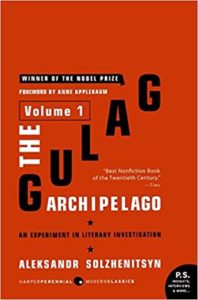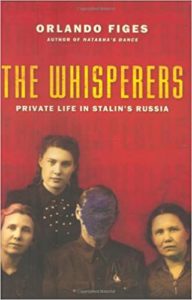Communism kills. 100 million lost souls in the 20th century, not from war or natural causes, but from state execution. Let that sink in – 100 MILLION.

OK, now back to scholarly recommendations for books to learn about and understand this experience. In previous posts, I recommended books that focused on the Russian Revolution, the Soviet economy, the ethnography of Soviet life, and revisionist accounts of Soviet history.
Obviously, the classic work in this regard is Aleksandr Solzhenitsyn’s The Gulag Archipelago (originally published in 1973). The impact of this work cannot be overstated. And, it should be read by every student of civilization in the 20th century.
In addition to the official prison system that the Soviet system utilized for repression, there existed the day-to-day repression of everyday life and social interaction outside of the prison walls. But it was still a prison culture of the mind. The best book I know of to explore this is Orlando Figes’s The Whisperers: Private Life in Stalin’s Russia (originally published in 2008). The book demonstrates how daily life revolved around having to whisper to your close confidantes to hide from the prying eyes and ears of state surveillance. There were also those who you believed would be your confidantes who themselves would strategically whisper behind your back.

In one of my books on post-communism, I relay the story of Vera Wollenberger, who was a leader of the dissident group “The Church from Below” in East Germany. After the collapse of communism and German re-unification, she agitated for the Stasi to open their files as part of the reconciliation process. When her file was opened, it turned out her own husband – Knud Wollenberger – continually filed reports on her activities with the Stasi.
Think through the logic of attempting to live under such a regime.
The most comprehensive study of the archives and the death toll under communism in the 20th century is The Black Book of Communism edited by Stéphane Courtois (originally published in 1997). This is the book that establishes in excruciating detail from the archives the 90 to 100 million deaths by communist governments in the 20th century through political repression, execution, labor camps, and orchestrated famines. As I said to start this section – COMMUNISM KILLS.
Another gruesome tour through the crimes against humanity committed in the name of communism is Steven Rosefielde’s Red Holocaust (originally published in 2010), which argues that the most accurate number is 60 million. Still Rosefielde admits that there are most likely tens of millions more that we just cannot corroborate with the archival data and never will because they are lost.
Let me end this section referencing a book by Alain Besancon, that ties together the ideology, the institutional manifestations, and the terror of the Soviet experience. There are other great sweeping books in this genre, such as Mikhail Heller and Aleksandr Nekrich’s Utopia in Power (1988), but if you had to read one book to make sense of the economic deprivation and political repression of the Soviet Union, and why those in the west misunderstood for so long it would be Alain Besancon’s The Origins of the Gulag (originally published 1981).
Conclusion
I used to kid around with my students about “nonsense speak” in writing papers, and I would give as the example someone starting a paper with the phrase, “The history of the Soviet Union is very, very, very interesting.” Of course it is, but lots of things are very, very, very interesting. But that sort of opening phrase says nothing. Do not do it. Claims in social science papers should have a bite, they should be bold, and they should be potentially wrong. Science and scholarship should “hurt” if we are wrong. “The history of the Soviet Union demonstrates the intellectual bankruptcy of communism as an ideal.” Now we can begin a contested conversation over a claim. We must offer conjectures subject to refutation in the dialogue with our peers.
Key to understanding Soviet Socialism is coming to grips with the claim that communism is not an ideal that humanity failed to live up to, but that communism is an ideology that is simply incompatible with humanity and human betterment. It is an ideology, as Oscar Wilde warned, that robs the soul of man, and it is an ideology, as Ludwig von Mises warned, that destroys the means of our material progress. The greatest large-scale social experiment of the 20th century was also the greatest large-scale social failure of the 20th century.
Hopefully, this reading guide will get you started on your own course of study to see what the lessons learned from this experiment are, and why we must never forget them.
Peter J. Boettke is University Professor of Economics & Philosophy, George Mason University, Fairfax, VA 22030.


READER COMMENTS
David Henderson
Jun 10 2020 at 6:01pm
Neat. I had no idea about Oscar Wilde’s view of Communism. The most interesting thing I’ve read today.
Mark Brady
Jun 11 2020 at 2:02am
Oscar Wilde died in 1900 so he certainly didn’t write about the Soviet Union. In his essay The Soul of Man under Socialism (1891), he distinguished between two sorts of socialism.
“Socialism, Communism, or whatever one chooses to call it, by converting private property into public wealth, and substituting co-operation for competition, will restore society to its proper condition of a thoroughly healthy organism, and insure the material well-being of each member of the community. It will, in fact, give Life its proper basis and its proper environment. But for the full development of Life to its highest mode of perfection, something more is needed. What is needed is Individualism. If the Socialism is Authoritarian; if there are Governments armed with economic power as they are now with political power; if, in a word, we are to have Industrial Tyrannies, then the last state of man will be worse than the first. At present, in consequence of the existence of private property, a great many people are enabled to develop a certain very limited amount of Individualism. They are either under no necessity to work for their living, or are enabled to choose the sphere of activity that is really congenial to them, and gives them pleasure. These are the poets, the philosophers, the men of science, the men of culture – in a word, the real men, the men who have realised themselves, and in whom all Humanity gains a partial realisation. Upon the other hand, there are a great many people who, having no private property of their own, and being always on the brink of sheer starvation, are compelled to do the work of beasts of burden, to do work that is quite uncongenial to them, and to which they are forced by the peremptory, unreasonable, degrading Tyranny of want. These are the poor, and amongst them there is no grace of manner, or charm of speech, or civilisation, or culture, or refinement in pleasures, or joy of life. From their collective force Humanity gains much in material prosperity. But it is only the material result that it gains, and the man who is poor is in himself absolutely of no importance. He is merely the infinitesimal atom of a force that, so far from regarding him, crushes him: indeed, prefers him crushed, as in that case he is far more obedient.”
Peter Boettke
Jun 11 2020 at 10:27pm
Mark,
i did not say Wilde was talking about the Soviet experience but of the ideology of socialism. And my view comes from the very text, and I think his error is that he believed socialism was economically viable, but spiritually crushing to the artistic soul.
note I invoke Mises on economics, not Wilde.
pete
Mark Brady
Jun 13 2020 at 11:17pm
Pete, I wanted to clarify what Oscar Wilde had said about socialism/communism for two reasons. He did not comment on the Soviet experience (and someone might have thought that he had since you mentioned him in an article on that topic). And I thought that people who weren’t familiar with him would be interested to learn of the distinction that he drew between “authoritarian socialism” and “individualism.” And I’d also point out that Wilde wrote his essay in 1891, eleven years before Nicolaas Pierson and 29 years before Ludwig Mises et al. and the subsequent socialist calculation debate. In other words, I suggest that the case against socialism/communism had less intellectual ammunition in 1891 than it did in 1920.
Robert A Gressis
Jun 19 2020 at 1:03pm
Hi Dr. Boettke,
One issue that I didn’t see you talk about in your incredibly helpful series was the issue of how the Soviet Union, and communist states more broadly, was received among the intelligentsia–by which I mostly mean academics, independent scholars, journalists, artists, and well-read government bureaucrats–in the USA and western Europe.
I noticed, for example, that many of the books you recommended were published before the USSR’s demise. How were they received at the time? Were those critical of the USSR treated as fascistic apologetics? Were most members of the western intelligentsia privately critical of the USSR, but reluctant to say so, for fear of sanction from their more ideologically committed leftwing members of their peer group? Were the works you praised regarded as obviously wrong and malevolent at the time only to later be treated as obviously but trivially right?
I’m asking, because I think it will give me some insight into present-day political dynamics.
Comments are closed.